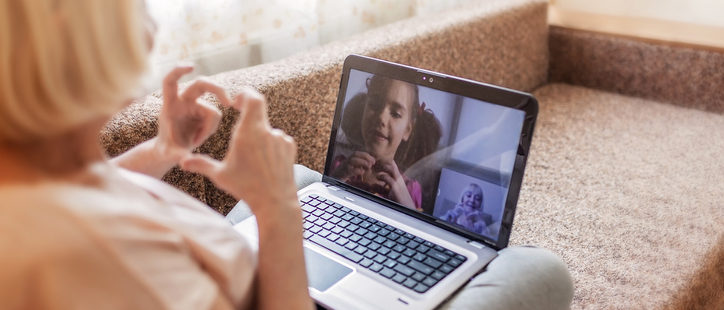On 23 April 2020, Kate Shurety took part in an Instagram Live Q&A with Pete Bombaci, Chief Connection Offcer of a Canadian organisation called the GenWell Project. In this blog, she outlines a number of the issues they discussed around loneliness and connection, including how Covid has led to a deficit of touch, and the impact of that on loneliness, and the power of the human voice.
Connecting in Canada
I recently took part in my first Instagram Live event, hosted by Pete Bombaci from the GenWell Project. Lockdown has meant I haven’t been out much beyond my back garden, so making new connections and ‘going live’ for the first time was close to exhilarating!
The GenWell Project came out of an experience in Canada when a widespread power blackout created a surge of connections and people reaching out to each other in their communities. Their campaign aims to inspire and encourage face-to-face connection.
“Touch, which should be so comforting and connecting is now potentially fraught with risk of infection.”
However, with the current pandemic and lockdown, face-to-face connection is hard for many people right now, so overcoming those obstacles and finding other ways to connect and maintain relationships has become more important than ever.
Losing touch
Pete was a wonderful host, asking a series of thought-provoking questions. A recurring theme was about touch, and what the current ‘deficit’ of touch, due to Covid, might mean. I know how much my attitude has changed recently in response to films or footage of people in crowds or touching each other.
“Face-to-face connection is hard for many people right now, so finding other ways to connect and maintain relationships has become more important than ever.”
We discussed how we might need to adjust when lockdown is eased. What will feel appropriate from a public health perspective and when might that shift? Touch, which should be so comforting and connecting is now potentially fraught with risk of infection.
The power of the human voice
This had led to the need to find different ways to recognise each other and connect. The human voice is central to some of that; even just talking to someone on the phone and sharing experiences of what’s on TV, what’s happening on your street or what you plan to eat later.
We also need to listen to each other. Just being attentive on the other end of a phone call when there’s not much to say can still be a powerful way of being present with somebody.
Tackling stigma
There are a range of experiences that can trigger or exacerbate loneliness. Many of these experiences are worsened by the virus. This can include losing your job or income, to being cut off from your usual social circles, to bereavement. Although it is often hard to admit when you feel lonely, it can help to remind us to connect to others.
“Just being attentive on the other end of a phone call when there’s not much to say can still be a powerful way of being present with somebody.”
Struggling to admit to feelings of loneliness can be exacerbated by the stigma which still surrounds it. Pete spoke eloquently on this point, noting that it can sometimes be easier to reach out to help someone else than admit you need support. But the reciprocity of connecting can still make it a powerful antidote to loneliness: “Helping someone else not only helps them – but makes you feel more connected and positive too.”
One of the more powerful things Pete said of the GenWell Project, was that “we don’t think of ourselves as a cause, we’re a catalyst,” and I think that really sums up the kind of work they do, and the similarities with our work and with others in the UK too.
How to get involved
This coming weekend (May 2/3 2020) is one of two GenWell weekends as part of their campaign with the theme of ‘Just One More’; reach out to just one more friend, relative or someone you’ve not contacted for a while.
As for me, I’m already making a mental note of who will be on my own ‘Just One More’ list this weekend, and how great it will be to catch up after a long time.Who might you reach out to?



.png)


No comments on this article yet. Please feel free to submit a comment below.
By submitting a comment you grant Campaign to End Loneliness a perpetual license to reproduce your words and name/web site in attribution. Inappropriate and irrelevant comments will be removed at an admin's discretion. Your email is used for verification purposes only, it will never be shared.